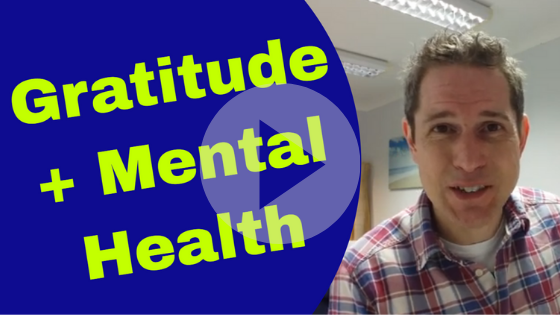Gratitude and Well-Being: How To Improve Your Well-Being and Self-Esteem
In my last article I wrote all about the impact of gratitude on anxiety, depression and self-esteem (have a read here: The Impact of Gratitude on Anxiety, Depression, Self-Esteem and Well-being). The research I talked about there shows that gratitude is strongly related to several aspects of well-being and mental health.
People who have a disposition to notice and appreciate positive aspects in their life and their world tend to be happier, more optimistic, have positive self-esteem and are more positive and they also experience less depression and anxiety symptoms. In fact, gratitude can be considered to offer some protection against depression and anxiety because you are able to encourage and be compassionate and reassuring towards yourself when things go wrong in life and when faced with challenges.
As the researchers concluded, “gratitude is also associated with an improved “relationship with the self,” in the form of a more positive and compassionate way of treating ourselves when things go wrong in life, which partially explains why grateful people are also less depressed and anxious” (Petrocchi & Couyoumdjian (2015)).
As I mentioned in that last article, with so many mental health benefits of gratitude, it really does make sense to purposefully apply it in your life. You are more likely to feel happy, have positive self-esteem, a better sense of well-being and experience less anxiety and depression symptoms.
And if you do want to benefit from these good things then I’ll be covering some ways you can do so in this article.
How To Increase Gratitude and Well-Being
There are three general methods that can be used to induce gratitude to produce positive outcomes; gratitude lists, behavioural expressions of gratitude and grateful contemplation.
I talk briefly about these in this video and you can read more about how to benefit below. Firstly, click on this image and have a quick watch of my video:
There are so many positive mental health benefits and you can benefit by investing a very small amount of time in carrying out one or more of these methods:
1) Gratitude Lists
“The “classic” gratitude intervention involves making written lists of several things for which one is grateful on a regular basis. For example, people may be asked to keep a diary, in which they write three things for which they are grateful, to be completed each night directly before bed” (Wood, 2010).
As a method of promoting gratitude this has the huge benefit of being straightforward to do and it can be done in just a few minutes a day.
In discussing gratitude lists, Wood (2010) cites research suggesting that gratitude lists can help decrease body dissatisfaction in people with severely impaired body image, significantly decrease worry in people with excessive worrying (and who may have generalised anxiety disorder) and increase the satisfaction of school children with their school experience (finding school interesting, feeling good at school etc).
Let’s remind ourselves that gratitude has been positively associated with optimism, self-esteem, happiness and life satisfaction and negatively associated with anxiety and depression symptoms. Using gratitude lists, you may find that for an investment of a few minutes a day you start to benefit if you do this consistently and diligently each night.
2) Behavioural Expressions of Gratitude
A second method of fostering gratitude involves behavioural expression of gratitude. For example, you might write and deliver a letter to a person (a ‘gratitude letter’) whom you have not yet thanked properly.
Again Wood (2010) cites research where this gratitude task was used and found more happiness and less depression amongst participants, however, whilst large effects were positive, the results were more short lived compared to some other approaches (e.g. focusing on three good things).
Of course, you could interpret this more widely as adopting behaviours and an attitude where you seek out and recognise opportunities to express gratitude. This could involve a simple thank you when someone holds a door or passes you something, or you could take it further and express your gratitude and appreciation in other ways such as getting them flowers or a small gift. Given the upside of being grateful, it seems to me that the more you can incorporate it into your life and find opportunities to express gratitude, the better.
3) Grateful Contemplation
Less specific than the above two methods, grateful contemplation involves thinking or writing about things you are grateful for in a more global fashion.
Research findings suggest that this “brief gratitude intervention focused on positive experiences, lasting only minutes, might be a useful way to raise immediate mood” (Wood).
Rash et al. (Gratitude and Well-Being, 2011), examined the efficacy of a four week gratitude contemplation intervention program in improving well-being. Participants were asked to think about people for whom, or items or moments for which they were grateful in the past week, and to sustain the feelings of gratitude associated with these people, items or moments. They were asked to reflect on one of them for five minutes and then to write down their grateful experience in a journal. This gratitude contemplation process was completed twice a week over the course of four weeks.
The results showed that undergoing this grateful contemplation produces positive psychological responses. It led to increases in self-esteem, and increased life satisfaction.
“Life satisfaction refers to the cognitive portion of well-being in which quality of life is assessed on the basis of an individual’s own unique set of criteria…When an individual assesses life satisfaction, they are assessing the positive side of an experience rather than focusing on unpleasant emotions…Research demonstrates that people who attend to and recall the pleasant aspects of life more easily are happier and more satisfied with their lives” (Rash et al., 2011).
Interestingly, this research also looked at the type of things people thought and wrote about as part of their grateful contemplation. And they found that “it may not be important what people specifically think about in the gratitude intervention, but that whatever they choose seems to have the same general effect…simply asking people to think about things for which they are grateful is sufficient versus asking them to think about specific people or events” (Rash et al.).
In other words, spending ten minutes twice a week can improve your levels of self-esteem and life satisfaction (and from all the research it will also make you feel more positive and happier) and, you can focus on whatever people, places, events and things you are grateful for in your life to benefit from the impact of gratitude.
Develop An Attitude of Gratitude!
As you can gather from the three methods above, you really don’t have to invest too much time into this, yet putting a few minutes of thinking and action into place on a consistent basis can have very positive outcomes. Gratitude leads to improved well-being, self-esteem and well-being and reduced anxiety and depression symptoms.
I’d love to know how you get on with these so do drop me an e-mail (dan@danreganhypnotherapy.co.uk) once you’ve consistently practiced them for a while and I’ll look forward to hearing about your successes.
To your happiness,
Dan Regan
Hypnotherapy in Ely & Newmarket
Seeking help to overcome your anxiety and boost your self-esteem? Book your Complimentary Hypnotherapy Strategy Session with Dan now: Appointments
Find out what many other people have said after their hypnotherapy sessions with Dan here: What People Say
And check out these powerful hypnosis downloads that can start helping you overcome anxiety and boost self-esteem right away: Hypnosis Downloads
References:
Petrocchi, Nicola, and Alessandro Couyoumdjian. “The impact of gratitude on depression and anxiety: the mediating role of criticizing, attacking, and reassuring the self.” Self and Identity15, no. 2 (2016): 191-205.
Rash, Joshua A., M. Kyle Matsuba, and Kenneth M. Prkachin. “Gratitude and well‐being: Who benefits the most from a gratitude intervention?.” Applied Psychology: Health and Well‐Being 3, no. 3 (2011): 350-369.
Wood, Alex M., Jeffrey J. Froh, and Adam WA Geraghty. “Gratitude and well-being: A review and theoretical integration.” Clinical psychology review 30, no. 7 (2010): 890-905.





0 Comments